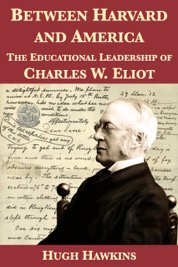 $9.99 on Kindle, Nook, Apple Books, Kobo, Google Play
$9.99 on Kindle, Nook, Apple Books, Kobo, Google Play(cover by Susan Erony)
Between Harvard and America: The Educational Leadership of Charles W. Eliot by Hugh Hawkins (130,000 words, 21 illustrations)
“Charles William Eliot, President of Harvard from 1869 until 1909, was unquestionably the most influential leader of American higher education during the last one hundred years. Both born and married into Boston high society, he brought wisdom, administrative skill, tough-minded vision, and, above all, patience to his leadership of the nation’s oldest and most prestigious college. In his 40 years as president Eliot transformed that college into America’s leading university, becoming at the same time a prototype of the modern university executive. Charles Eliot was a man of affairs as well as judgment, a spokesman for American culture as well as higher education, and a consummate blend of conservatism and innovation in an age when each was highly valued.
Hugh Hawkins has written a book to match the man. Neither biography nor institutional history, this unconventional account traces the interaction between Eliot and Harvard on the one hand and American society on the other. In the process we encounter virtually every social question impinging upon education with which we are still dealing... Eliot had to resolve issues involving federal aid to higher education, the mixture of required and elective studies in both undergraduate and professional schooling, the relationship between teaching, research, and institutional health and prestige, the political activities of faculty and students, and the proper role of faculty, administration, and laymen in governing universities. Hawkins explores these questions in great depth and with a sure grasp of what their answers mean in the everyday lives of faculty and students. Calling upon a wealth of original research and previous scholarship, he outlines pressures, problems, and temptations which have a very contemporary ring.” — Mark Beach, The Journal of Higher Education
“Hugh Hawkins has written a lucid, stimulating account of the most crucial turning-point in the history of American higher education... Hawkins’ scholarship is resourceful and meticulous... He writes with great clarity, attentiveness, and control... His thoroughness and cool intelligence produce solid monographic history at its very best... an important contribution to the social history of the age.” — Laurence Veysey, The Journal of American History
“A thorough, well balanced appraisal of Eliot and of his relationship to Harvard and to American society. Mr. Hawkins has admirably combined historical analysis and narrative biography with mutually beneficial consequences.” — John H. Fischer, Teachers College, Columbia University
“[A] fascinating and thought-provoking assessment of Eliot and the university milieu in which he operated... the book is a delight to read. The text does have a crisp quality, and it resonates from the author’s obviously diligent researches... Hawkins has pieced together a first-rate portrait of a formidable man bringing great talents to bear on the many-faceted problem of improving education in the United States.” — Daniel Leab, The New England Quarterly
“This is a first-rate study... informed, thoughtful, and well written.” — George W. Pierson, The American Historical Review
“Hawkins argues that Eliot’s liberalism became a force in Harvard’s transformation, freeing faculty and students for a new kind of university life. Hawkins has formulated a major thesis, important for understanding both Eliot and the transformation of education in the second half of the nineteenth century. He also has written a committed, relevant book... the significance of Harvard in the academic revolution emerges more vividly than ever... In two superb chapters, ‘From College to University,’ and ‘The System of Liberty,’ Hawkins describes a process of historical change far beyond anything Eliot himself might have comprehended fully. Hawkins triumphs over the static, snap-shot effect of a structural analysis. He presents a dynamic story of a growing university, with its leader, its evolving bureaucratic arrangements, its new departments and schools, its changing methods of teaching and research, its committee system and administration, its invention of pensions and sabbaticals.” — David F. Allmendinger, History of Education Quarterly
“Eliot brought Harvard and with it the nation’s colleges into the modern world; he infused his college with the spirit of free inquiry and gained for higher education a position where it could maintain its precarious independence from the giant centers of powers in the nation’s economy and politics. Hawkins’ book makes it abundantly clear at what price and with what means Eliot’s and Harvard’s victories were gained. It shows that in the modern world there cannot be even in academia a sanctuary free of managers and administrators; that the function of higher education’s trustees is precisely that rationalizing and merging of interests which will allow the institutions of learning to survive in a world whose clocks do not run on academic time. Hugh Hawkins’s book is one of the finest and most judicious studies of the conditions under which modern academic man established his existence in America.” — Jurgen Herbst, Reviews in American History
“[A] most authoritative study of Charles W. Eliot... a remarkable document of social history of the American people at a particularly momentous era of their maturation... quite a compelling book.” — D. J. Johnston, British Journal of Educational Studies
“[A] carefully researched, scholarly study... I recommend... this responsible and interesting account of that giant among men, Charles William Eliot, his work at Harvard and his relation to America.” — Earl V. Pullias, The Phi Delta Kappan



